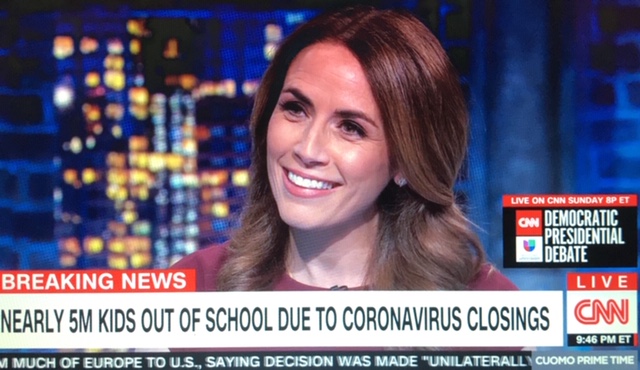Closures due to coronavirus can mean an interruption in meals that children depend on.
by Alexis Glick
Click here to watch Alexis on CNN’s Cuomo Prime Time
As the health crisis around the coronavirus (COVID-19) heightens, U.S. public school districts in Maryland, Ohio and Kentucky are announcing the closures of schools. In fact, in Seattle area schools, closures have already occurred, with other states and cities in the U.S. currently on heightened alert of the possibility of school closures happening in their communities. These closures could span a period of days, some for the suspected 14-day incubation period of the virus, some for a few weeks, and possibly a few indefinitely. There is no way of knowing for certain what will happen in the days and weeks to come.
No one questions the wisdom of state agencies, superintendents, and boards of education in making the decision to close schools, particularly when health authorities are advising that “social distancing” – keeping people apart, and not congregating in groups or crowds – is an important step in stopping, or slowing, the spread of the virus. But we should be aware that school closures can create problems of their own.
Tens of millions of children depend on the U.S. Department of Agriculture’s National School Meal Program, which provides nutritionally balanced, low-cost or no-cost meals to children each school day. The program has been in existence since 1946. Each school year approximately 30 million children are nourished through the program.
Beginning in 1966, federally assisted meals were extended to school breakfast as well, and the School Breakfast Program (SBP) was made a permanent entitlement by Congress in 1975. As many as 15 million school children annually benefit from it.
School meals are vitally important in high-need and under-served schools particularly, where large percentages of children rely on them as a significant contributor to their nutrition. Unfortunately, among very high-need families, school meals can sometimes be the only meal some children get.
In a country like ours, in which 1 in 6 children is food-insecure, school breakfast and school lunch are a lifeline – one in which the closing of schools, even if it is for a valid and necessary public-health reason, can have dire consequences.
As CEO of a child-wellness nonprofit focused on creating healthy school communities, a good deal of our work is centered around what health professionals and educators have come to call “the learning connection” – the positive impact of nutrition (and physical activity) on academic success. Hungry children simply can’t learn well – good morning nutrition has a direct impact on brain development, cognition, and social/emotional skills, and nourished students are subject to fewer discipline problems, less absenteeism, and numerous other benefits. Any teacher will tell you this.
But during school closures, breakfast and lunch aren’t just about supporting learning – they’re about preventing hunger and food insecurity.
For just this reason, the Centers for Disease Control’s interim guidance to schools that have identified cases of COVID-19 is that schools should ensure the continuity of meal programs; they should consider ways to distribute food to students; if there is a community spread of the virus, they should design strategies to avoid distribution in settings where people might gather in a group or crowd; and they should consider options such as grab-and-go bagged lunches or meal-delivery models like mobile trucks.
Additionally, the USDA, which has national oversight of school-meal programs, has advised that during an unexpected school closure, schools can leverage their participation in one of USDA’s summer meal programs to provide meals at no cost to students. Under normal circumstances, those meals must be served in a group setting. However, in a public health emergency, the law allows USDA the authority to waive the group-setting requirement, which is vital during a social-distancing advisory. States must apply for these waivers as needed.
To ensure continuity in feeding, schools are definitely being creative in implementing effective processes to get meals to students. For example, some districts are sending letters home to parents announcing that, should schools need to close, the district’s Nutrition Services Department will provide community-wide pickup sites for boxed lunches, to be eaten at home. Others are using school buses to deliver meals through bus routes. And many high-need school districts already have summer-feeding programs in place, and are switching to those strategies during coronavirus closings.
GENYOUth, the organization I lead, for the last several years has helped to scale alternative school breakfast in which school breakfast is provided in the form of Grab and Go breakfast carts in cities nationwide – which have been found to increase school breakfast program participation by up to 27%. Since 2017, with the support of the private sector, we’ve awarded 370 breakfast cart systems to high-need schools nationwide, increasing access to 37 million school breakfasts in the process. We’ve learned a thing or two about school nutrition, and understand why the challenges we are facing are unprecedented in nature.
I salute the work being done at this difficult time by the USDA and the CDC, as well as by my colleagues at the School Nutrition Association (SNA), and educators nationwide, all of whom are prioritizing access to school meals and are working overtime to make it happen. In the days and weeks ahead we need to work together, be patient, but act urgently, roll up our sleeves to volunteer, and keep in mind that healthy, nourished children are as much a part of public health as the prevention of the spread of disease.
Alexis Glick is CEO of the national youth-wellness nonprofit GENYOUth
